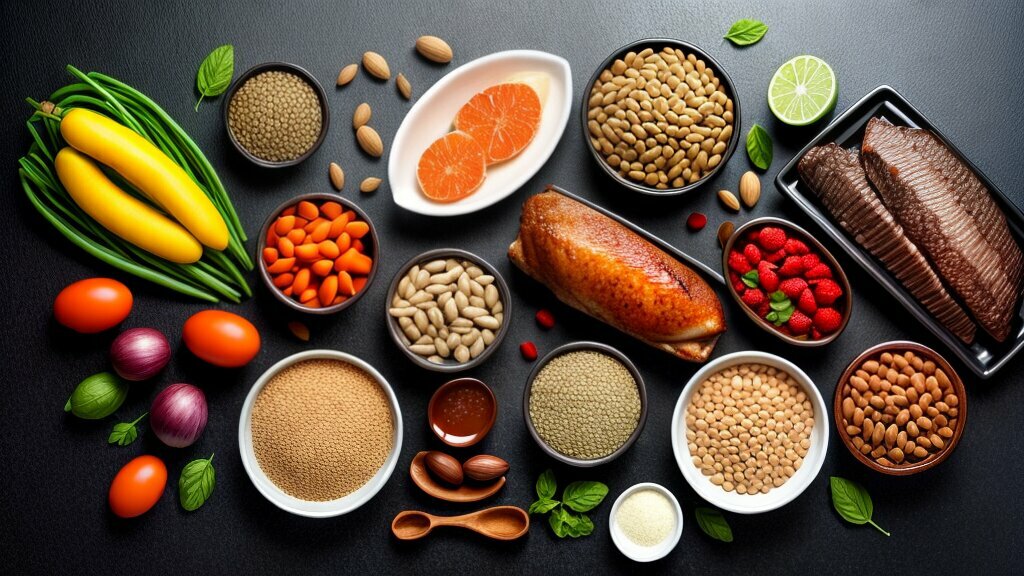If you’re looking to improve your health and wellbeing, incorporating more protein into your diet is a great place to start. High-protein diets have been shown to have a range of benefits, from supporting weight loss to improving heart health and boosting energy levels. In this article, we’ll explore the many advantages of a protein-rich eating plan and how it can enhance your fitness journey.
Key Takeaways
- Incorporating more protein into your diet can support weight loss and muscle gain.
- High-protein diets improve heart health and regulate blood sugar levels.
- Eating a protein-rich diet can boost energy levels and metabolism.
- There are many sources of high-quality protein, including meat, fish, eggs, and plant-based options.
Understanding the Health Benefits of High-Protein Diets
If you’re looking to enhance your overall health and wellbeing, then a high-protein diet could be just what you need. A protein-rich diet is beneficial for a number of reasons, including:
| Benefits of High-Protein Diets |
|---|
| 1. Improved Muscle Mass: Consuming more protein helps to build and maintain muscle mass, which is especially important for those who exercise regularly. |
| 2. Reduced Appetite: Protein is known to reduce appetite and keep you feeling fuller for longer, which can aid in weight loss efforts. |
| 3. Increased Bone Strength: High-protein diets have been linked to stronger bones, reducing the risk of fractures and osteoporosis. |
| 4. Improved Metabolic Health: Protein can help regulate blood sugar levels and improve metabolic health, reducing the risk of type 2 diabetes. |
These are just a few of the many benefits of consuming a high-protein diet. By incorporating more protein into your meals, you can improve your overall health and wellbeing.
Image source: 
Enhancing Your Fitness Journey with a Protein-Rich Diet
Whether you’re just starting out with a fitness routine or are a seasoned athlete, incorporating more protein into your diet can help you achieve your goals. A high-protein diet can aid in building and maintaining muscle mass, increasing strength, and improving overall athletic performance.
Protein is essential for repairing and rebuilding muscle tissue, which is especially important after a workout. Consuming protein within 30 minutes to an hour after exercise can help maximize muscle recovery and growth.
In addition to muscle benefits, a protein-rich diet can also aid in weight loss. Protein has a higher thermic effect than carbohydrates or fats, meaning that your body burns more calories digesting protein than it does other nutrients.
| Benefits of Incorporating More Protein into Your Diet: |
|---|
| 1. Increased muscle mass and strength |
| 2. Improved athletic performance |
| 3. Faster muscle recovery |
| 4. Weight loss |
When incorporating more protein into your diet, it’s important to choose high-quality sources such as lean meats, fish, eggs, and plant-based options like beans, lentils, and tofu. Try to aim for at least 20-30 grams of protein per meal for optimal benefits.
Remember, a protein-rich diet is just one aspect of a well-rounded fitness routine. Be sure to also prioritize regular exercise, hydration, and adequate rest for optimal results.

Boosting Energy Levels and Metabolism with Protein
A high-protein diet not only helps you lose weight, but it also increases your energy levels and metabolic rate. Proteins are complex molecules that take longer to digest than carbohydrates or fats, which means that your body uses more energy to break them down. This process is known as the thermic effect of food (TEF), and it can increase your metabolic rate by up to 30%.
Moreover, high-quality proteins contain essential amino acids that your body needs to produce energy, repair tissues, and maintain healthy organs. By consuming adequate amounts of protein on a regular basis, you can avoid crashes, fatigue, and brain fog, and feel more energized throughout the day.
| Advantages of a High-Protein Eating Plan for Energy and Metabolism |
|---|
| Increases your metabolic rate and calorie burning |
| Provides a sustained source of energy |
| Prevents overeating and cravings |
| Helps maintain muscle mass and strength |
If you’re an athlete or fitness enthusiast, consuming enough protein is essential for optimal performance. Protein plays a crucial role in building and repairing muscles, reducing inflammation, and promoting recovery after exercise. By incorporating more high-quality protein sources into your diet, such as lean meat, fish, eggs, dairy, nuts, and seeds, you can support your fitness goals and enhance your overall wellbeing.
Tip: Try adding a scoop of protein powder to your smoothies, yoghurt, or oats for a quick and easy boost of energy and protein.

Supporting Heart Health and Blood Sugar Regulation
A high-protein diet offers benefits beyond just building muscle and aiding weight loss. It can also support heart health and regulate blood sugar levels.
When it comes to your heart, a protein-rich diet may help to reduce blood pressure and cholesterol levels, both of which are risk factors for heart disease. One study showed that participants who consumed a high-protein diet had a 40% lower risk of developing high blood pressure compared to those who consumed low amounts of protein.
In terms of blood sugar regulation, protein can help to slow down the absorption of sugar into your bloodstream, preventing spikes in blood sugar levels. This is important as consistently high blood sugar levels can lead to insulin resistance and type 2 diabetes. By incorporating more protein into your diet, you can help to improve your body’s ability to regulate blood sugar levels.

“A high-protein diet may help to reduce blood pressure and cholesterol levels, both of which are risk factors for heart disease.”
Incorporating High-Quality Protein into Your Diet
Adding more protein to your diet is a great way to improve your overall health and wellbeing. But not all protein is created equal. When choosing protein sources, opt for high-quality, nutrient-dense options that provide the most benefits.
Some examples of high-quality protein sources include:
| Food | Protein Amount (per 100g) |
|---|---|
| Chicken breast | 31g |
| Sockeye salmon | 25g |
| Lentils | 9g |
| Quinoa | 4g |
Incorporating high-quality protein sources like these into your meals can help to enhance your overall health and fitness journey by providing your body with the nutrients it needs to perform at its best.
If you’re struggling to get enough protein in your diet, consider supplementing with a high-quality protein powder. This can be a convenient and easy way to boost your protein intake, especially if you’re always on the go.
Remember, choosing high-quality protein sources is key to reaping the benefits of a protein-rich diet. So next time you’re at the grocery store, be sure to fill your cart with plenty of nutrient-dense options to fuel your body and support your health and wellbeing.

Conclusion
Congratulations on taking the first step towards improving your health and wellbeing by considering a high-protein diet. By incorporating more protein into your meals, you can experience a range of benefits, including increased energy levels, improved metabolism, and better heart health.
Remember to choose high-quality protein sources, such as lean meats, fish, eggs, and dairy products, and aim to include a variety of protein-rich foods in your diet. It’s also important to consult a healthcare professional before making any drastic changes to your eating plan, especially if you have any pre-existing health conditions.
With the right approach and a little bit of effort, you can unlock the many benefits of a protein-rich diet and support your fitness and wellness journey. So why not start today and reap the rewards of a healthier, happier you?
FAQ
Q: What are the benefits of a high-protein diet?
A: Consuming a high-protein diet has several advantages for your health and wellbeing. It provides your body with the necessary amino acids needed for muscle repair and growth. It can also support weight loss by increasing feelings of satiety and boosting metabolism. Additionally, a high-protein diet can help regulate blood sugar levels and improve heart health.
Q: What are the health benefits of high-protein diets?
A: High-protein diets have numerous health benefits. They can aid in muscle development and repair, improve bone health, and support brain function. Protein is also essential for the production of enzymes, hormones, and antibodies. Additionally, a high-protein diet can help reduce cravings and promote healthy weight management.
Q: How can a protein-rich diet enhance your fitness journey?
A: Incorporating more protein into your diet can greatly enhance your fitness journey. Protein helps repair and build muscles, which is crucial for strength and endurance. It also supports the recovery process after intense workouts and can improve overall athletic performance. Furthermore, a protein-rich diet can help reduce muscle soreness and inflammation.
Q: What are the benefits of a protein-rich diet for energy levels and metabolism?
A: A protein-rich diet provides several benefits for energy levels and metabolism. Protein is a vital component of energy production and can help prevent fatigue. It also has a higher thermic effect, meaning it requires more energy to digest and metabolize, which can boost the body’s calorie-burning potential. Additionally, a protein-rich diet can help regulate blood sugar levels, preventing energy spikes and crashes.
Q: How do high-protein diets support heart health and blood sugar regulation?
A: High-protein diets have been associated with improved heart health and blood sugar regulation. They can help lower bad cholesterol levels and reduce the risk of heart disease. Protein also helps stabilize blood sugar levels, preventing unhealthy spikes and dips. Additionally, a high-protein diet can aid in weight management, which is important for maintaining heart health and regulating blood sugar.
Q: How can I incorporate high-quality protein into my diet?
A: There are several ways to incorporate high-quality protein into your diet. You can include lean meats, such as chicken, turkey, and seafood. Plant-based protein sources, like beans, lentils, and tofu, are also excellent options. Greek yogurt, eggs, and nuts are other protein-rich foods to consider. Adding protein shakes or bars can be convenient for on-the-go individuals. It’s important to choose high-quality sources of protein to maximize the benefits.
